现在完成时-初二英语
英语人教版八年级下册现在完成时构成及用法

现在完成时(Present Perfect Tense )1.现在完成时的构成现在完成时由“助动词have ( has)+过去分词”构成。
下面以动词finish 为例,例如:I haven’t bought anything for two months.3.现在完成时和一般过去时的区别现在完成时表示过去发生的某一动作对现在造成的影响或结果,强调的是现在的情况,所以它不能和表示过去的时间状语连用,例如:yesterday, last night, three weeks ago, in 1990等。
而一般过去时只表示过去的动作或状态,和现在不发生联系,它可以和上述表示过去的时间状语连用。
例如:I have seen the film.我看过这部电影。
(我了解这部电影的内容。
)I saw the film last week.我上个星期看了这部电影。
(只说明上星期看了这部电影,不涉及现在的情况。
)He has lived here since 1992. 1992年以来他一直住在这里。
(他现在还住在这里)He lived here in 1992. 1992年他住在这里。
(不涉及他现在是否还住在这里。
)练习一。
选择1.—_________you ______ him before ?—No,not yet。
A.Have ; metB. Did ;meetC. Do; meetD. Were ; meeting2.—Let’s go shopping ,Lily ! Have you finished your homework _______?—No, not _______.A. just; yetB. ever ; alreadyC. yet; yetD. ever; just3.—Lily ,why are you still here ? School is over for half an hour.—Because I ______ my task yet. I still need one more hourA. won’t finishB. don’t finishC. haven’t finishedD. hadn’t finished4.—I’d like to introduce my best friend to you ,Peter.—Thank you, Lucy. But we ______ already.A. meet B .met C. will meet D. have met5.—Have you finished your work _____?—Yes, I have. I’ve ________ finished it .A. yet; alreadyB. already ; yetC. already; alreadyD. yet ; yet6.—Have you found your IPod?—_____________.A. No, you haveB. Not yetC. Yes, I doD. Yes, I found7.Lucy’s never been to Beijing , _______ she ?A. isB. isn’tC. hasD. hasn’t8.Mary ______ yet. I’m waiting for her .A.. came back B .has come back C. hasn’t come back D. was com ing back9.—_________ you ______ out the problem, Sam?—Not yet, but I’m going to .A. Did; workB. Are; workingC. Have; workedD. Will; work10.—_______you _______ a pen on the desk ?—Yes, but Miss Liu ______it away just now.A. Have; seen; has taken B .Have; seen ;took C. Have; see; took D. Do ; see; has taken11.—Have you cooked supper ________?—Yes, I have ________ finished it .A. yet ; justB. yet; everC. already; yetD. already ;just12.Mr.Wnag isn’t here ,I think he _____ Shanghai.A. went B has been to C. has gone to13.—Hello! Could I speak to Lily/—Sorry ,she is not in .She ________ Shanghai.A. have been toB. have gone toC. has been toD. has gone to14.Neither my sister nor I ______ been to America before.A. have everB. have neverC. has everD. has never15.He _______ to Beijing many times.A. have been B . has been C. have gone D. has gone16.—Have you ever left your keys in your house?— No, _________.A. ever B . already C. yet D. never17.Mr.Green _______ China for ten years.A. has been to B .has been in C. has come to D . has gone to18.—He ________ the English –Chinese dictionary for about ten years ,but it is still new .— What a careful man!A. has boughtB. has borrowedC. has hadD. bought19.In the last ten years changes _________ place in my hometown.A. took B . had taken C. have taken D. take20.Zhao Lan ______ already ______ in this school for two years.A. was ;studyingB. will ; studyC. has ; studiedD. are; studying21.Hurry up ! The play ______ for ten minutes.A. has begunB. had begunC. has been onD. begun22.—How long have you _____ China?—For three years .A. come backB. returnedC. leftD. been away from23.—Oh, Mrs. King, your necklace looks nice. Is it new?—No ,I _______ it for two years.A. hadB. have hadC. boughtD. have bought24.—You are leaving your school .How do you like it?—Very much, of course .I _____this school since I moved here .A. have gone toB. came toC. have been toD. have been at25.—I’m sorry to keep you waiting for a long time.—Oh, not at all. I ______ here for only a few minutes.A. have arrived B have been C. arrived D was26.—Hello, this is Lily speaking. Could I speak to Mr. Black?—Sorry. He _____ Beijing .A. has been to B . has gone to C. has been in D. will go to27.H e ________ in this factory for 20 years already.A. will workB. worksC. has worked D is working28.—I wonder when you ______ the new watch.—Well, I ____ it for two weeks.A. have bought; have hadB. bought; have boughtC. bought; have hadD. have bought; have bought29.The Browns________ Water World twice.A. went toB. has been toC. have been to D . have been in30.Tom ____ Mary in 1998.That is to say ,they _____ for 15 years.A .got married with; have got married B. got married to ; have marriedC. married; have been marriedD. married to ; have been married31.—I’m sorry .I ______ your printer for such a long time .—Never mind.A. have borrowedB. have lentC. have keptD. have bought32.—What a nice bike ! How long _____you ________ it ?—Just two weeks .A. have ;boughtB. did ; buyC. have ; hadD. are; having33.—__________you ever_______ Chinese moon-cakes, Diana?—No, never .But I have had noodles.A. Do; tryB. Will; tryC. Did ;tryD. Have ; tried34.—________ has your brother studied in New York?—For two years.A. How farB. How oldC. How oftenD. How long35.—When ______ your mother _____ you that blue dress,Mary?—Sorry ,I really can’t remember.A. does; buyB. has; boughtC. had; boughtD. did ; buy36.—_________ has your uncle been to Canada ?—Only twice .A. How many timesB. How oftenC.How longD.How far37.—How beautiful your skirt is! Is it new?—No,I have ________ it for two months.A. borrowedB. boughtC. had D got38.—How long have you collected shells?—__________.A. After I left schoolB. Before I moved hereC. When I went to the beachD. Since I was ten years old39.—What are you going to do this weekend ?—I _________ yet.A. haven’t decideB. won’t decideC. have decidedD. didn’t decide40.Great changes _______ in our city since 1980.A. took placeB. have taken placeC. happenedD. have happened41.—I have never been to American Computer Museum .What about you ?—________ .A. So do IB. So have IC. Neither do ID. Neither have I42.He _______ the house ,and you can put your things in it .A. cleaningB. cleaning outC. cleaned D . has cleaned out43.Tom has never ______Australia. But his parents have ______ theretwice.A. been to ; been to B . been ; gone C. been to ; been D. gone ;gone二。
初二人教英语现在完成时态课件(共25张PPT)

常见非延续性动词和延续性动词的转变
❖ arrive/come/go to be in
die
be dead
❖ become a
be a borrow
keep
❖ Leave/ move
be away / be out
❖ buy
have open
be open
❖ join
be in/a member of
5. --How many times _h_a_v_e____ you __r_e_a_d___ (read) this book?
❖ --I _h_a_v_e_r_e_a_d_ (read) it several times.
6. My brotherb_ou_g_h_t____ (buy) a car last month.
❖ The twins have joined the army. (since they are 18years old) The twins have been soldiers/ been in the army since they are 18years old.
-- When c_a_m_e_____ she _________ (come)? -- She ________ (come) just now.
I lived there 2 years ago
past
present
I have lived here for two years
❖ 1.都表示过去发生的事 ❖ 2.现在完成时强调过去和现在的联系,不能和具
定回答) He has already finished a story book.
4.He finished reading a story- book. (改成现在完成时)
八年级英语语法:现在完成时的用法
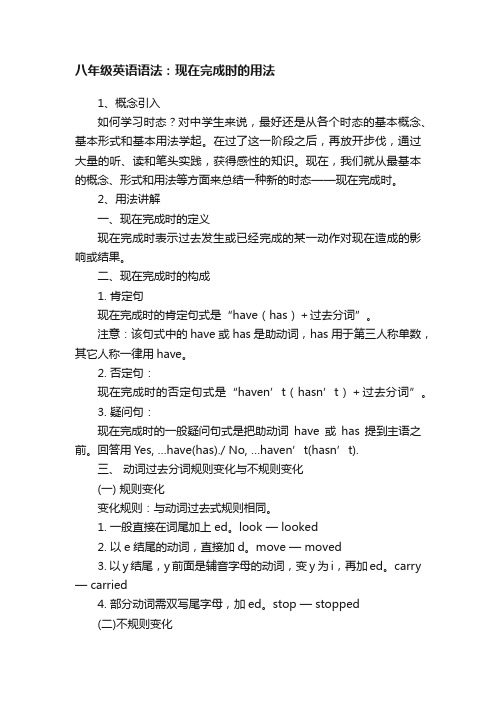
八年级英语语法:现在完成时的用法1、概念引入如何学习时态?对中学生来说,最好还是从各个时态的基本概念、基本形式和基本用法学起。
在过了这一阶段之后,再放开步伐,通过大量的听、读和笔头实践,获得感性的知识。
现在,我们就从最基本的概念、形式和用法等方面来总结一种新的时态——现在完成时。
2、用法讲解一、现在完成时的定义现在完成时表示过去发生或已经完成的某一动作对现在造成的影响或结果。
二、现在完成时的构成1. 肯定句现在完成时的肯定句式是“have(has)+过去分词”。
注意:该句式中的have或has是助动词,has用于第三人称单数,其它人称一律用have。
2. 否定句:现在完成时的否定句式是“haven’t(hasn’t)+过去分词”。
3. 疑问句:现在完成时的一般疑问句式是把助动词have或has提到主语之前。
回答用Yes, …have(has)./ No, …haven’t(hasn’t).三、动词过去分词规则变化与不规则变化(一) 规则变化变化规则:与动词过去式规则相同。
1. 一般直接在词尾加上ed。
look — looked2. 以e结尾的动词,直接加d。
move — moved3. 以y结尾,y前面是辅音字母的动词,变y 为i,再加ed。
carry — carried4. 部分动词需双写尾字母,加ed。
stop — stopped(二)不规则变化不规则动词的变化因词而异。
但是如果对不规则动词的过去式和过去分词做一分析,就可发现其中的“规则”。
同学们在记忆时,可按下面的形式对教材后不规则动词表进行分析、整理。
例如:AAB型原形过去式过去分词中文beat beat beaten 打败ABC 型原形过去式过去分词中文be was / were been 是,在…begin began begun 开始blow blew blown 吹break broke broken 破裂、折断AAA型原形过去式过去分词中文cost cost cost 花费cut cut cut 砍、切、割hit hit hit 打、撞ABA型原形过去式过去分词中文become became become 成为come came come 来ABB型原形过去式过去分词中文understand understood understood 理解、明白bring brought brought 带来build built built 建造burn burned/burnt burned/burnt 燃烧四、现在完成时的用法现在完成时表示过去某时发生的行为对主语目前产生的影响。
初二现在完成时全解
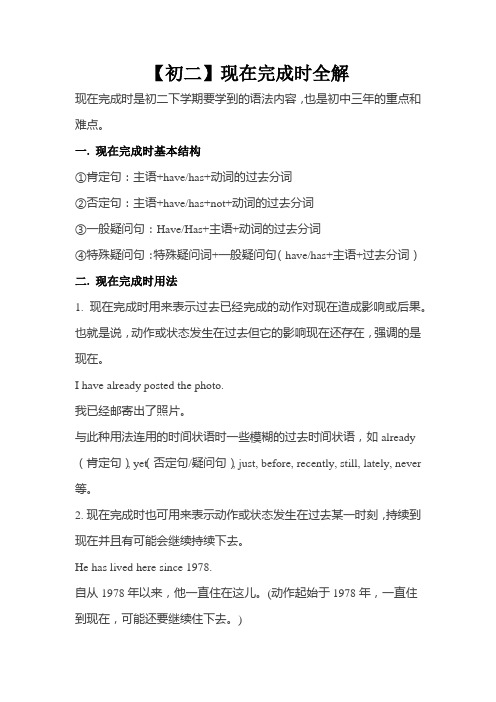
【初二】现在完成时全解现在完成时是初二下学期要学到的语法内容,也是初中三年的重点和难点。
一. 现在完成时基本结构①肯定句:主语+have/has+动词的过去分词②否定句:主语+have/has+not+动词的过去分词③一般疑问句:Have/Has+主语+动词的过去分词④特殊疑问句:特殊疑问词+一般疑问句(have/has+主语+过去分词)二. 现在完成时用法1. 现在完成时用来表示过去已经完成的动作对现在造成影响或后果。
也就是说,动作或状态发生在过去但它的影响现在还存在,强调的是现在。
I have already posted the photo.我已经邮寄出了照片。
与此种用法连用的时间状语时一些模糊的过去时间状语,如already (肯定句), yet(否定句/疑问句), just, before, recently, still, lately, never 等。
2. 现在完成时也可用来表示动作或状态发生在过去某一时刻,持续到现在并且有可能会继续持续下去。
He has lived here since 1978.自从1978年以来,他一直住在这儿。
(动作起始于1978年,一直住到现在,可能还要继续住下去。
)此种用法常与for(+时间段),since(+时间点或过去时的句子)连用。
谓语动词必须是延续性动词。
有些瞬间动词可变为延续动词:go out----be outfinish----be overopen----be opendie----be deadbuy---havefall ill---be illcome back----be backcatch a cold----have a cold三. 现在完成时常见考法对于现在完成时的考查,多以单选、句型转换或词语运用的形式考查学生在具体语境中灵活运用时态的能力。
在考试中,会让大家判断是否该用现在完成时,或者是考查“瞬间动词”不能与表示一段时间的状语连用”这一知识点。
现在完成时(unit8--unit10知识点总结)人教版英语八年级下册

现在完成时一.定义三要素与构成〔has/have done〕1.表示到现在为止已经完成或刚刚完成的动作。
By now, I have remembered 1000 English words.2.一件发生在过去的事情对现在产生影响。
常见时间状语:常和already〔已经〕,yet〔已经〕,just〔刚刚〕,still〔仍旧〕,so far〔到目前为止〕,till now,(直到现在),before〔以前〕,ever〔曾经〕,3 times(三次),in the past/last..years(在过去几年)I have spent all of my money so far.(1)already:〔已经〕用于确定句位置:放于助动词与done 之间或者放在句末(2)yet:疑问句〔已经〕否认句〔还〕位置:常放句尾(3)ever(曾经):疑问/确定位置:助动词与done之间(4)never〔从不〕位置:助动词与done之间【练习】〔1〕——你吃过早餐了吗?—Have you had breakfast ____?——是的,我已经吃过了。
/不,我还没吃。
—Yes,I have ________ had it./No,I haven’t had it ____.〔2〕I have ______ read this book,so I don’t know what it is about.〔3〕—Have you _____ been to the Great Wall? It’s so wonderful and great.—No,I have ______ been there.3.一个动作开头于过去,并持续到现在〔或许还将持续下去〕。
常见时间状语:①for+一段时间“长达/持续了……②since+过去一个时间点,表示“自从……以来〞时间段+ago,表示“从……以前〞+for+时间段从句〔一般过去时〕eg:Mary has been ill for three days.We have been classmates since 2 years ago.【练习】〔1〕我已经住在这里十年了。
八年级英语现在完成时知识点
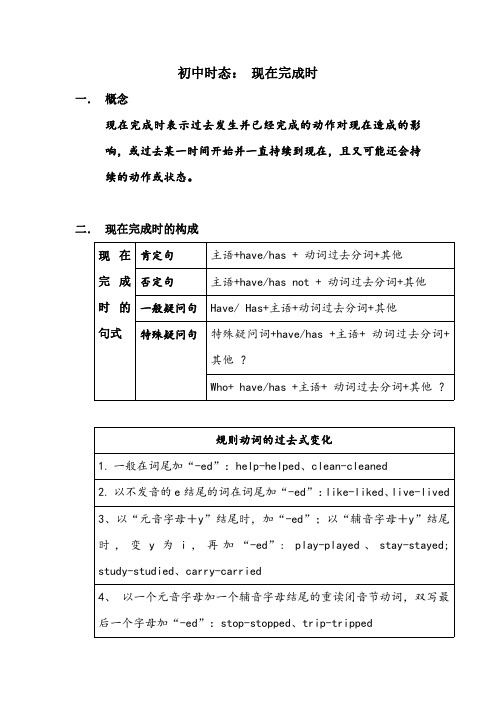
初中时态:现在完成时一.概念现在完成时表示过去发生并已经完成的动作对现在造成的影响,或过去某一时间开始并一直持续到现在,且又可能还会持续的动作或状态。
二.现在完成时的构成现在完成时的句式肯定句主语+have/has+动词过去分词+其他否定句主语+have/has not+动词过去分词+其他一般疑问句Have/Has+主语+动词过去分词+其他特殊疑问句特殊疑问词+have/has+主语+动词过去分词+其他?Who+have/has+主语+动词过去分词+其他?规则动词的过去式变化1.一般在词尾加“-ed”:help-helped、clean-cleaned2.以不发音的e结尾的词在词尾加“-ed”:like-liked、live-lived3、以“元音字母+y”结尾时,加“-ed”;以“辅音字母+y”结尾时,变y为i,再加“-ed”:play-played、stay-stayed; study-studied、carry-carried4、以一个元音字母加一个辅音字母结尾的重读闭音节动词,双写最后一个字母加“-ed”:stop-stopped、trip-tripped三.现在完成时的用法1.表示过去发生并已经完成的动作对现在造成的影响:I have heard of the man.2.过去某一时间开始并一直持续到现在,且又可能还会持续的动作或状态:I have lived in this city since I was born.四.常与一般现在时连用的时间状语already,yet(常用于否定句和疑问句中表示“仍,还”),before, recently,never,ever,once,twice等。
I have already finished my homework.固定的短语:for+一段时间,since+过去时间点+ago,so far, up to now,in the past/last three yearsI have been here since two months ago.五.难点拓展1.since和for的区别since用来说明动作的起始时间,for用来说明动作延续的时间长度。
初二英语现在完成时
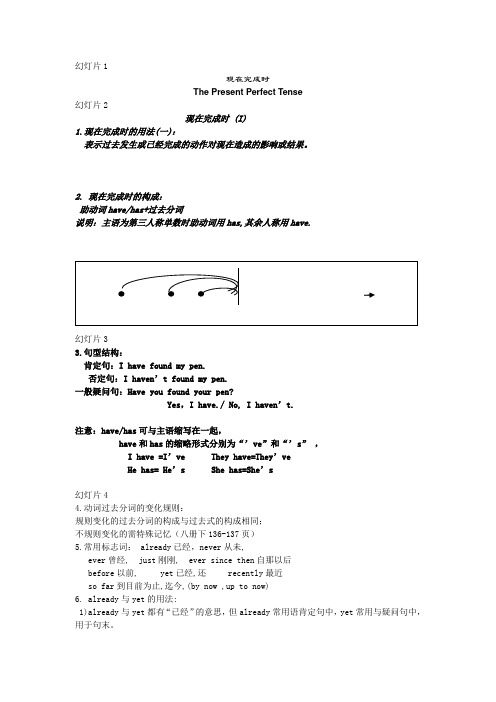
幻灯片1现在完成时The Present Perfect Tense幻灯片2现在完成时 (I)1.现在完成时的用法(一):表示过去发生或已经完成的动作对现在造成的影响或结果。
2. 现在完成时的构成:助动词have/has+过去分词说明:主语为第三人称单数时助动词用has,其余人称用have._______________ _ _ _ 幻灯片33.句型结构:肯定句:I have found my pen.否定句:I haven’t found my pen.一般疑问句:Have you found your pen?Yes,I have./ No, I haven’t.注意:have/has可与主语缩写在一起,have和has的缩略形式分别为“’ve”和“’s”,I have =I’ve They have=They’veHe has= He’s She has=She’s幻灯片44.动词过去分词的变化规则:规则变化的过去分词的构成与过去式的构成相同;不规则变化的需特殊记忆(八册下136-137页)5.常用标志词: already已经,never从未,ever曾经, just刚刚, ever since then自那以后before以前, yet已经,还 recently最近so far到目前为止,迄今,(by now ,up to now)6. already与yet的用法:1)already与yet都有“已经”的意思,但already常用语肯定句中,yet常用与疑问句中,用于句末。
I’ve already seen this film.我已经看过这部电影。
Have you seen the film yet?你已经看过这部电影了吗?幻灯片52) yet用于否定句中,意为“还(没);尚(未)”,置句末。
I haven’t seen the film yet.我还没看过这部电影。
3) already和yet的转换肯定句:I have already finished reading the book.变为否定句I haven’t finished reading the book yet.变为一般疑问句Have you finished reading the book yet?补充:already 还可用于特殊疑问句中:What books have you already read?幻灯片6现在完成时(II)现在完成时表示是否去过某地的用法:1.have/has been to 表示“曾经去过(某地)”,可以与never, ever, just, twice等副词连用I have been to a museum.Have you ever been to a museum?I have never been to a museum.He has been to the museum twice.2. have/has been to与have/has gone to的区别have/has been to 表示“曾经去过(某地)”have/has gone to 表示“已经去了(某地)”幻灯片73. 现在完成时和一般过去时的区别1)现在完成时表示过去发生的某一动作对现在造成的影响,强调的是现在的情况;而一般过去时表示过去发生的动作或存在的状态。
英语人教版八年级下册现在完成时
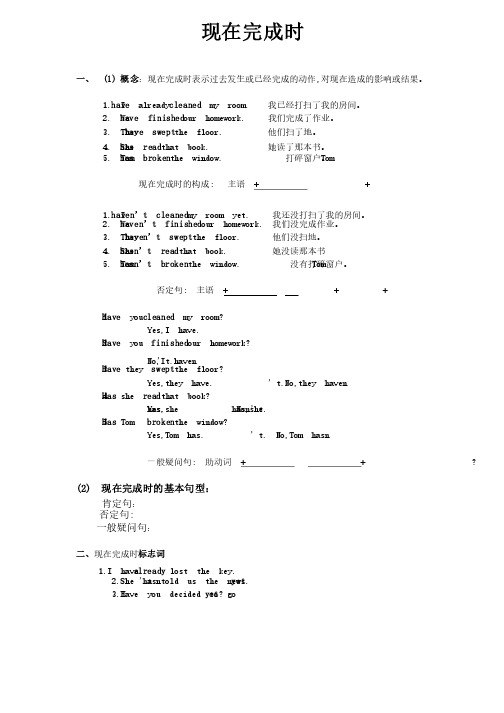
现在完成时一、 (1) 概念:现在完成时表示过去发生或已经完成的动作:现在完成时表示过去发生或已经完成的动作,,对现在造成的影响或结果。
对现在造成的影响或结果。
1. I have already c leaned cleaned my room. 我已经打扫了我的房间。
我已经打扫了我的房间。
2. We have finished our homework. 我们完成了作业。
我们完成了作业。
3. They have swept the floor. 他们扫了地。
他们扫了地。
4. She has read t hat book. that book. 她读了那本书。
她读了那本书。
5. Tom has broken the window. Tom 打碎窗户。
打碎窗户。
现在完成时的构成现在完成时的构成: : 主语主语 + + + +1. I haven haven’’t cleaned my room yet. 我还没打扫了我的房间。
我还没打扫了我的房间。
2. We haven haven’’t finished our homework. 我们没完成作业。
我们没完成作业。
3. They haven haven’’t swept t he floor. the floor. 他们没扫地。
他们没扫地。
4. She hasn hasn’’t read t hat book. that book. 她没读那本书她没读那本书5. Tom hasn hasn’’t broken t he window. Tom the window. Tom 没有打碎窗户。
没有打碎窗户。
否定句否定句: : 主语主语主语 + + + + + +1. Have you c leaned cleaned my room?Yes,I have.2. Have y ou you finishedour homework? No,I haven ’t. 3. Have they swept t he floor?the floor? Yes,they have. No,they haven ’t.4. Has she read t hat book?that book? Yes,she has. No,she hasn hasn’’t.5. Has Tom broken t he window?the window? Yes,Tom has. No,Tom hasn ’t.一般疑问句一般疑问句: : 助动词助动词助动词 + + ? + + ?(2) 现在完成时的基本句型:肯定句:肯定句:否定句否定句: : 一般疑问句:一般疑问句:二、现在完成时标志词1.I have already lost the key.2.She hasn ’t told us the news yet .3.Have you decided to go yet ?4.I have just cleaned my hands.5.John has never been to Nanjing6.Have you ever been to a museum?7.He has stayed here since 5 5 o o ’clock.David has lived here since 1992.8.He has has stayed stayed stayed here here since 5 5 hours hours hours ago. ago.His father has been in the Party since 10 years ago.9.She has taught English since he he came came came here. here.She has taught us since I came to this school.10.He has kept the book for 2 weeks.I have had this dictionary for t hree years.three years. Since: (自…以来)(1)(2)(3)for(长达)just (谓语动词之前谓语动词之前谓语动词之前) before() before(句末)句末) so far so far 到目前为止到目前为止in the past/last few years(过去几年来过去几年来) )练一练:练一练:选用选用 for for 和 since 填空填空: :1.We haven ’t seen each other ______ a long time.2.His father has been in the Party ______ 10 years ago.3.The film has been on ______ 20 minutes.4.Mr Green has worked here ______ he came to China.5.His grandparents have been dead ______ several years.6. It ’s five years _______ we met last time.1.The house is dirty. We _______it for weeks.A didn ’t cleanB hadn ’t cleanedC don ’t cleanD haven ’t cleaned2. ---Have you found your keys _______---Yes, I have _______ found them.A already; yetB yet;alreadyC already;alreadyD yet;yet3.3. -- I ’m sorry to keep you waiting.--Oh, not at all. I _____here only a few minutes.A have beenB had beenC wasD will be4.4. You don ’t need to describe her. I _______ her several times. A. had met B have met C met D meet5. --Will you go to Beijing for vacation ?--I _______ to go , but I don ’t know if I can go .A was planningB have plannedC had been planningD have been planning planning6. --When will they leave ?--They ______very soon .A do leaveB are leavingC have leftD leave7 --Was he studying for an exam ?--Yes , he's ____ it last week.A doingB to takeC makingD to give8.The teacher told the pupils that the earth ____ round.A isB wouldC wasD were9.9. She _______ such an interesting book before.A was never readingB will never readC had never readD has never rea10.10. How long do you think the meeting ______A is lastingB is lastedC will lastD lasts11. 11. I ____________(wait) for him for two hours . I am very angry . I ____________(wait) for him for two hours . I am very angry .12. 12. He _________ (be) a doctor since he was twenty .13. 13. The film __________ (be) on for fifteen minutes .14. 14. ____ you ever ____ (read) that book before ?15. 15. ____ you ever ____ (try) to change her ?16. 16. No one ____________ (arrive) here yet . No one ____________ (arrive) here yet .17. 17. ______ the bus _____ (leave) yet ?18. 18. I____ I____ I____ already already already ______ ______ ______ (see) (see) (see) the the the film. film. film.19. 19. My My My father father father ____ ____ ____ just just just _____ _____ _____ (come) (come) (come) back back back from from from work. work.20. 20. I I I _____________ _____________ _____________ (work) (work) (work) here here here since since since I I I ______ ______ ______ (move) (move) (move) here here here in in in 1999. 1999. 21. 21. So So So far far far I I I _______________(make) _______________(make) _______________(make) quite quite quite a a a few few few friends friends friends here. here.22. 22. -How -How -How long long long _______ _______ _______ the the the Wangs Wangs Wangs _______(stay) _______(stay) _______(stay) here? -For here? -For two two weeks. weeks. weeks.23. 23. I I I ________ ________ ________ just just just ___________ ___________ ___________ (finish) (finish) (finish) my my my homework. homework. homework.24.______ 24.______ you you you ______ ______ ______ (find) (find) (find) your your your science science science book book book yet? yet?一般过去时与现在完成时之比较1)一般过去时表示过去某时发生的动作或单纯叙述过去的事情,强调动作,和现在不发生关系。
(完整版)八年级下现在完成时全面知识点
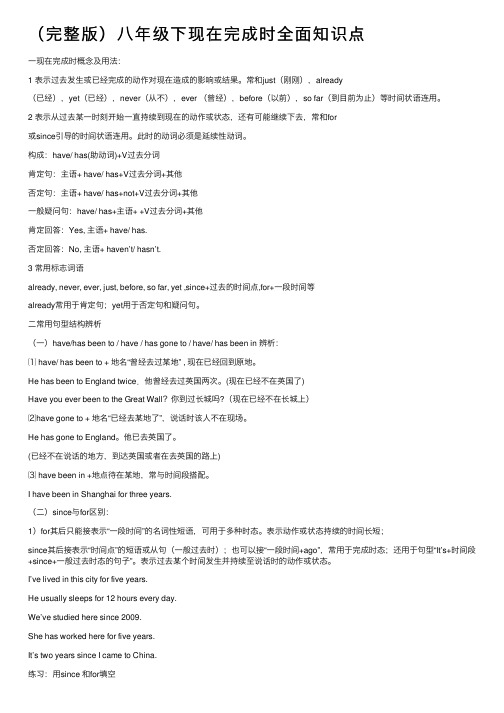
(完整版)⼋年级下现在完成时全⾯知识点⼀现在完成时概念及⽤法:1 表⽰过去发⽣或已经完成的动作对现在造成的影响或结果。
常和just(刚刚),already(已经),yet(已经),never(从不),ever (曾经),before(以前),so far(到⽬前为⽌)等时间状语连⽤。
2 表⽰从过去某⼀时刻开始⼀直持续到现在的动作或状态,还有可能继续下去,常和for或since引导的时间状语连⽤。
此时的动词必须是延续性动词。
构成:have/ has(助动词)+V过去分词肯定句:主语+ have/ has+V过去分词+其他否定句:主语+ have/ has+not+V过去分词+其他⼀般疑问句:have/ has+主语+ +V过去分词+其他肯定回答:Yes, 主语+ have/ has.否定回答:No, 主语+ haven’t/ hasn’t.3 常⽤标志词语already, never, ever, just, before, so far, yet ,since+过去的时间点,for+⼀段时间等already常⽤于肯定句;yet⽤于否定句和疑问句。
⼆常⽤句型结构辨析(⼀)have/has been to / have / has gone to / have/ has been in 辨析:⑴ have/ has been to + 地名“曾经去过某地” , 现在已经回到原地。
He has been to England twice.他曾经去过英国两次。
(现在已经不在英国了)Have you ever been to the Great Wall?你到过长城吗?(现在已经不在长城上)⑵have gone to + 地名“已经去某地了”,说话时该⼈不在现场。
He has gone to England。
他已去英国了。
(已经不在说话的地⽅,到达英国或者在去英国的路上)⑶ have been in +地点待在某地,常与时间段搭配。
初二英语《现在完成时》PPT课件

in January.
Complete the passage with the correct form of the verbs. Nicky: I’ve just (1)____ seen (see) a great TV
programme about space. Did you
Put the words in order to make sentences. 1. we / just / TV / programme / on / a / watch / have /. _____________________________ We have just watched a programme _____. on TV
A: Have you… ? B: Yes, …/ No, … (using already, just, ever, yet, never)
Put the words in the correct place in each sentence.
1. They haven’t been to Mars. ( yet ) __________________________ They haven’t been to Mars yet. 2. Many astronauts have visited the space station. ( already ) Many astronauts have already visited _______________________________ the space station. ______________
Look at these sentences. The astronauts have gone to the space station. They’ve gone there, but they haven’t come back. The astronauts have been to the space station. They went there and they came back.
人教版八年级下册现在完成时专项讲解
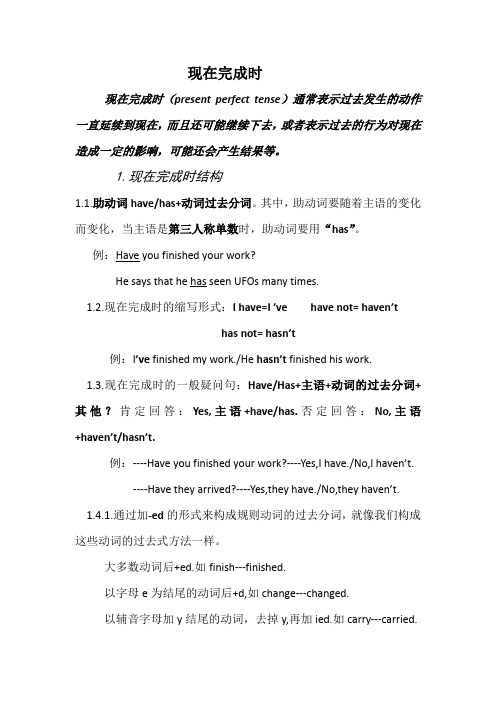
现在完成时现在完成时(present perfect tense)通常表示过去发生的动作一直延续到现在,而且还可能继续下去,或者表示过去的行为对现在造成一定的影响,可能还会产生结果等。
1.现在完成时结构1.1.助动词have/has+动词过去分词。
其中,助动词要随着主语的变化而变化,当主语是第三人称单数时,助动词要用“has”。
例:Have you finished your work?He says that he has seen UFOs many times.1.2.现在完成时的缩写形式:I have=I ’ve have not= haven’thas not= hasn’t例:I’ve finished my work./He hasn’t finished his work.1.3.现在完成时的一般疑问句:Have/Has+主语+动词的过去分词+其他?肯定回答:Yes,主语+have/has.否定回答:No,主语+haven’t/hasn’t.例:----Have you finished your work?----Yes,I have./No,l haven’t.----Have they arrived?----Yes,they have./No,they haven’t. 1.4.1.通过加-ed的形式来构成规则动词的过去分词,就像我们构成这些动词的过去式方法一样。
大多数动词后+ed.如finish---finished.以字母e为结尾的动词后+d,如change---changed.以辅音字母加y结尾的动词,去掉y,再加ied.如carry---carried.以一个元音再加一个辅音结尾的短动词,双写辅音辅音字母再加ed.如stop---stopped1.4.2.构成不规则动词的过去分词的方法有所不同,需要特别记忆。
如:come---come; hurt---hurt. lend---lent; build---builtcatch---caught; keep---kept forget---forgotten tell---toldbe---been; have---had fall---fallen; fly---flowndraw---drawn; see---seen;think---thought.2.现在完成时的用法2.1.表示过去发生或已经完成的动作,对现在造成的影响或结果。
八年级英语现在完成时单选题50题
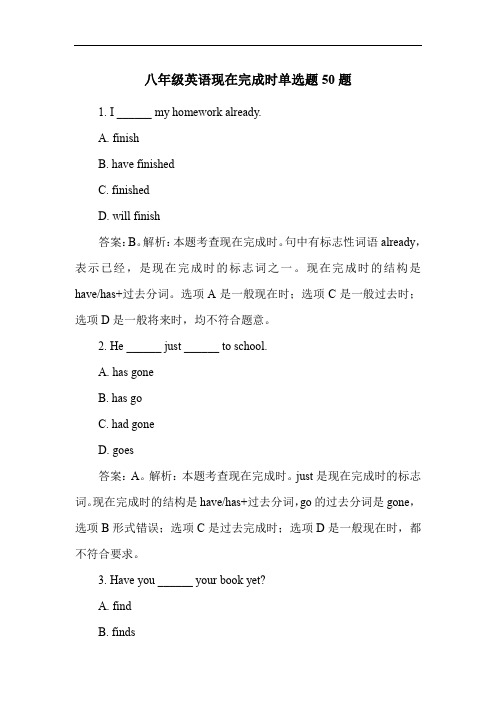
八年级英语现在完成时单选题50题1. I ______ my homework already.A. finishB. have finishedC. finishedD. will finish答案:B。
解析:本题考查现在完成时。
句中有标志性词语already,表示已经,是现在完成时的标志词之一。
现在完成时的结构是have/has+过去分词。
选项A是一般现在时;选项C是一般过去时;选项D是一般将来时,均不符合题意。
2. He ______ just ______ to school.A. has goneB. has goC. had goneD. goes答案:A。
解析:本题考查现在完成时。
just是现在完成时的标志词。
现在完成时的结构是have/has+过去分词,go的过去分词是gone,选项B形式错误;选项C是过去完成时;选项D是一般现在时,都不符合要求。
3. Have you ______ your book yet?A. findB. findsC. foundD. finding答案:C。
解析:本题考查现在完成时。
yet是现在完成时的标志词,用于疑问句或否定句中。
现在完成时的结构是have/has+过去分词,find的过去分词是found,选项A是原形,选项B是第三人称单数形式,选项D是现在分词形式,均不符合。
4. They ______ already ______ the exam.A. have takeB. have takenC. had takenD. takes答案:B。
解析:本题考查现在完成时。
already是现在完成时的标志词。
现在完成时的结构是have/has+过去分词,take的过去分词是taken,选项A形式错误;选项C是过去完成时;选项D是一般现在时的第三人称单数形式,都不符合题意。
5. She ______ not ______ her lunch yet.A. has eatB. has ateC. has eatenD. had eaten答案:C。
(完整版word)初二英语英语现在完成时知识点总结附答案
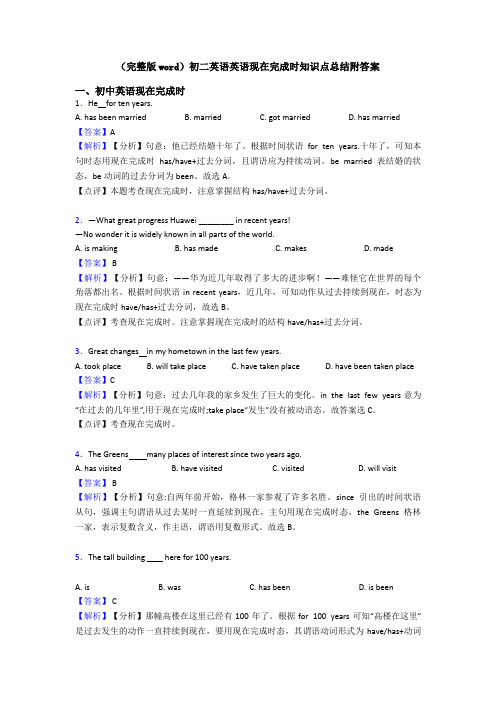
(完整版word)初二英语英语现在完成时知识点总结附答案一、初中英语现在完成时1.He for ten years.A. has been marriedB. marriedC. got marriedD. has married【答案】A【解析】【分析】句意:他已经结婚十年了。
根据时间状语for ten years.十年了,可知本句时态用现在完成时has/have+过去分词,且谓语应为持续动词。
be married表结婚的状态,be动词的过去分词为been。
故选A。
【点评】本题考查现在完成时,注意掌握结构has/have+过去分词。
2.—What great progress Huawei ________ in recent years!—No wonder it is widely known in all parts of the world.A. is makingB. has madeC. makesD. made【答案】 B【解析】【分析】句意:——华为近几年取得了多大的进步啊!——难怪它在世界的每个角落都出名。
根据时间状语in recent years,近几年,可知动作从过去持续到现在,时态为现在完成时have/has+过去分词,故选B。
【点评】考查现在完成时。
注意掌握现在完成时的结构have/has+过去分词。
3.Great changes in my hometown in the last few years.A. took placeB. will take placeC. have taken placeD. have been taken place 【答案】C【解析】【分析】句意:过去几年我的家乡发生了巨大的变化。
in the last few years意为“在过去的几年里”,用于现在完成时;take place“发生”没有被动语态。
故答案选C。
【点评】考查现在完成时。
人教版八年级英语下册现在完成时态讲解和练习
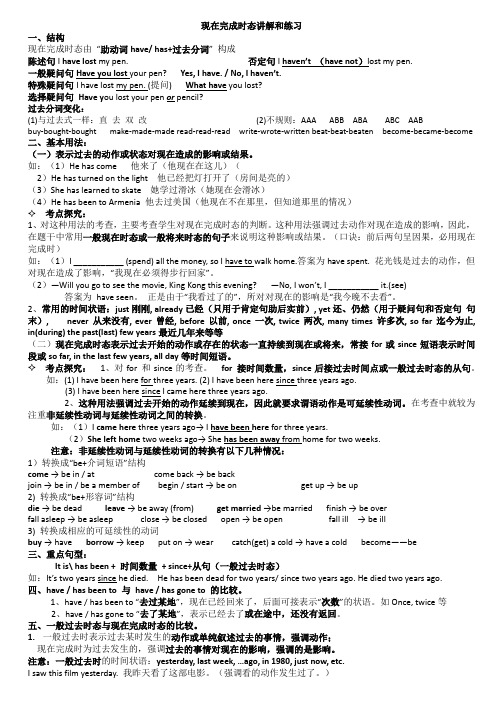
现在完成时态讲解和练习一、结构现在完成时态由“助动词have/ has+过去分词” 构成陈述句I have lost my pen.否定句I haven’t (have not)lost my pen.一般疑问句Have you lost your pen? Yes, I have. / No, I haven’t.特殊疑问句I have lost my pen. (提问) What have you lost?选择疑问句Have y ou lost your pen or pencil?过去分词变化:(1)与过去式一样:直去双改(2)不规则:AAA ABB ABA ABC AABbuy-bought-bought make-made-made read-read-read write-wrote-written beat-beat-beaten become-became-become 二、基本用法:(一)表示过去的动作或状态对现在造成的影响或结果。
如:(1)He has come 他来了(他现在在这儿)(2)He has turned on the light 他已经把灯打开了(房间是亮的)(3)She has learned to skate 她学过滑冰(她现在会滑冰)(4)He has been to Armenia 他去过美国(他现在不在那里,但知道那里的情况)✧考点探究:1、对这种用法的考查,主要考查学生对现在完成时态的判断。
这种用法强调过去动作对现在造成的影响,因此,在题干中常用一般现在时态或一般将来时态的句子来说明这种影响或结果。
(口诀:前后两句呈因果,必用现在完成时)如:(1)I ___________ (spend) all the money, so I have to walk home.答案为have spent. 花光钱是过去的动作,但对现在造成了影响,“我现在必须得步行回家”。
初二英语语法现在完成时

初二语法:现在完成时初二语法:现在完成时用法:(一)现在完成时表示过去发生或已完成的某一动作对现在造成的影响或结果。
与其连用的时间状语有:already ever just never yet recently 例如:I have already opened the window. 我已把窗户打开。
我已把窗户打开。
She won’t go to the cinema tonight because she has already seen it.她今晚不去看电影,因为她已经看过了她今晚不去看电影,因为她已经看过了构成:构成:1.肯定式构成:肯定式构成: have/has+动词过去分词。
2.否定式构成:否定式构成: have/has+not+动词过去分词。
have/has 与not 可分别缩写为haven’t, haven’t, hasn’t hasn’t 例如:例如:Miss Hu hasn’t come back yet. 胡小姐还没回来。
胡小姐还没回来。
3.疑问句的构成:疑问句的构成:将have/has 提到主语前,简略答语用:Y es ,主语+ have/has 或No ,主语主语 +haven’t/hasn’t .例如Have you ever made cakes ? Y es ,I have. No ,I haven’t.4.在现在完成时的各种结构中,have/has 均为助动词,无实际意义。
当主语是第三人称单数时要用has 。
have/has 之后要用动词的过去分词,规则动词的过去分词与过去式的变化规则相同,如:之后要用动词的过去分词,规则动词的过去分词与过去式的变化规则相同,如:finish finish——finished courage courage—— couraged study study——studied step step——stepped clap clap——clapped skim skim——————skimmed skimmed 5.不规则动词的过去分词的变化基本可分为下列五种类型:不规则动词的过去分词的变化基本可分为下列五种类型:1.) AAA (动词原形、过去式与过去分词同形)如:cut cut——————cut cut cut——————cut cut read read———— read read———— read 2.) ABB (过去式过与去分词同形)如:buy ————bought bought bought——————bought bought teach ————taught taught taught——————taught taught 3.)ABC(动词原形、过去式与过去分词各异) 如:如:drive ————drove drove drove—————— driven driven grow grow——————grew grew grew——————grown grown 4.)ABA (动词原形与过去分词同形) 如:come come——————came came came——————come come run run——————ran_ran_ran_——————run run 5.)AAB (动词原形与过去式同形) 如:beat beat——————beat beat beat——————beaten beaten 用法:( 二)现在完成时表示动作发生在过去并且一直持续到现在的动作或状态。
人教版英语八年级下册Unit8语法全解:现在完成时
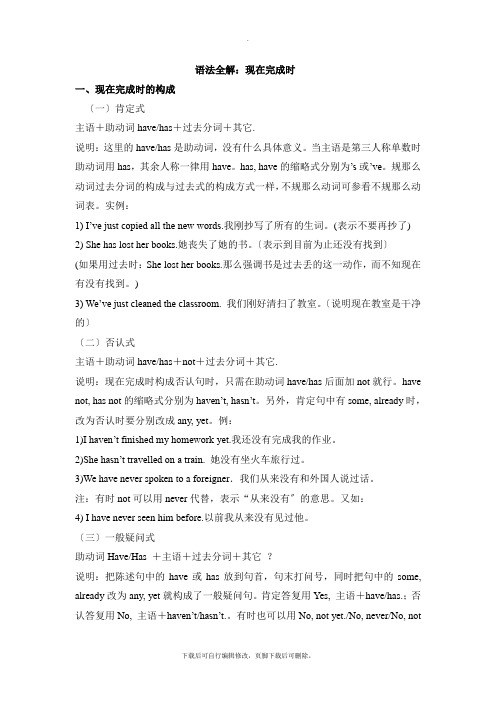
语法全解:现在完成时一、现在完成时的构成〔一〕肯定式主语+助动词have/has+过去分词+其它.说明:这里的have/has是助动词,没有什么具体意义。
当主语是第三人称单数时助动词用has,其余人称一律用have。
has, have的缩略式分别为’s或’ve。
规那么动词过去分词的构成与过去式的构成方式一样,不规那么动词可参看不规那么动词表。
实例:1) I’ve just copied all the new words.我刚抄写了所有的生词。
(表示不要再抄了)2) She has lost her books.她丧失了她的书。
〔表示到目前为止还没有找到〕(如果用过去时:She lost her books.那么强调书是过去丢的这一动作,而不知现在有没有找到。
)3) We’ve just cleaned the classroom. 我们刚好清扫了教室。
〔说明现在教室是干净的〕〔二〕否认式主语+助动词have/has+not+过去分词+其它.说明:现在完成时构成否认句时,只需在助动词have/has后面加not就行。
have not, has not的缩略式分别为haven’t, hasn’t。
另外,肯定句中有some, already时,改为否认时要分别改成any, yet。
例:1)I haven’t finished my homework yet.我还没有完成我的作业。
2)She hasn’t travelled on a train. 她没有坐火车旅行过。
3)We have never spoken to a foreigner.我们从来没有和外国人说过话。
注:有时not可以用never代替,表示“从来没有〞的意思。
又如:4) I have never seen him before.以前我从来没有见过他。
〔三〕一般疑问式助动词Have/Has +主语+过去分词+其它?说明:把陈述句中的have或has放到句首,句末打问号,同时把句中的some, already改为any, yet就构成了一般疑问句。
八年级下英语--现在完成时语法讲解
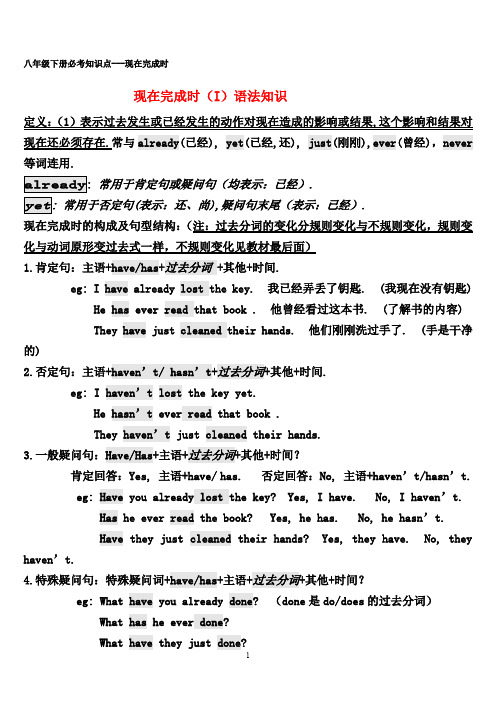
八年级下册必考知识点---现在完成时现在完成时(I)语法知识定义:(1)表示过去发生或已经发生的动作对现在造成的影响或结果,这个影响和结果对现在还必须存在.常与already(已经), yet(已经,还), just(刚刚),ever(曾经),never 等词连用.常用于肯定句或疑问句(均表示:已经).常用于否定句(表示:还、尚),疑问句末尾(表示:已经).现在完成时的构成及句型结构:(注:过去分词的变化分规则变化与不规则变化,规则变化与动词原形变过去式一样,不规则变化见教材最后面)1.肯定句:主语+have/has+过去分词+其他+时间.eg: I have already lost the key. 我已经弄丢了钥匙. (我现在没有钥匙) He has ever read that book . 他曾经看过这本书. (了解书的内容)They have just cleaned their hands. 他们刚刚洗过手了. (手是干净的)2.否定句:主语+haven’t/ hasn’t+过去分词+其他+时间.eg: I haven’t lost the key yet.He hasn’t ever read that book .They haven’t just cleaned their hands.3.一般疑问句:Have/Has+主语+过去分词+其他+时间?肯定回答:Yes, 主语+have/ has. 否定回答:No, 主语+haven’t/hasn’t. eg: Have you already lost the key? Yes, I have. No, I haven’t. Has he ever read the book? Yes, he has. No, he hasn’t.Have they just cleaned their hands? Yes, they have. No, they haven’t.4.特殊疑问句:特殊疑问词+have/has+主语+过去分词+其他+时间?eg: What have you already done? (done是do/does的过去分词)What has he ever done?What have they just done?定义:(2)现在完成时表示从过去开始一直持续到现在还有可能继续持续下去的动作或状态。
八年级英语语法讲解-现在完成时

1. 用含ago等过去时间状语的一般过去时。 1) He left here three years ago. 2) She came back two days ago. 2. “It is +一段时间+since +一般过去时从句 ” 1) It is three years since he left here. 2) It is two days since he came back. 3.一段时间+has passed + since + 一般过去时从句 1) Three years has passed since he left here. 2) Two days has passed since she came back. 以上三种表示方法适用于所有瞬间动词。
终止性(瞬间)动词是指那些动作一次完成,不能 延续的动词。如:come, go, buy, die, join, begin等. 这些动词的肯定式不能和段时间状语连用。 终止性(瞬间) 动词可以用于现在完成时,但不能 和表示一段时间的状语连用。 如可说“He has left.‖ ―She has come back‖ 但不能说“He has left for three years.‖ ―She has come back for two days‖ 如果要表达: 1) 他已走了三年了. 2) 她已经回来两天了 可用以下几种表达法:
She has swum since half an hour ago. 我已经游泳了半个小时 (半个小时前已经开始游泳,到现在还在游)
主菜单
上一页
下一页
一段时间的表达方法有两种: for a year 1) for + 一段时间 for two weeks for three years
人教版英语初二英语英语现在完成时知识点总结附解析

人教版英语初二英语英语现在完成时知识点总结附解析一、初中英语现在完成时1.My parents for twenty years by the time I was 15.A. marriedB. had marriedC. had been marriedD. had got married【答案】 C【解析】【分析】for twenty years“二十年”.为表一段时间的状语,要求谓语动词具有持续性。
而在所给选项中,只有be married表示结婚状态,具有延续性,故选C。
【点评】本题考查非延续性动词与延续性动词的转换。
2.—How do you like Beijing, Miss Read?—I've no idea. I _____ there.A. have goneB. have beenC. haven't beenD. haven't gone【答案】 C【解析】【分析】句意:---你觉得北京怎么样,瑞得小姐?---我不知道,我没有去过那儿。
短语:have been to去过某地(已经返回);have gone to去了某地(尚未返回),根据句意,故答案为C。
【点评】考查短语辨析,区分have been to与have gone to,理解句子,根据语境判断答案。
3.Mr.Fan in 2005.In other words,he for 9 years till now.A. got married;has been marriedB. married;had been marriedC. got married;had been marriedD. married;got married【答案】 A【解析】【分析】首先第一空表述的是一个发生在2005年(即过去)的一个动作,所以为一般过去时,其次 married 后面要接宾语,get married 表示的是短暂性动作,所以应填get married. 第二空由“till now”可知表示的是从过去直到现在的一种状态即为现在完成时,此处married做形容词“已婚的”故填“has been married”,故选A.【点评】此题考查了动词时态问题,同时也考查了“get married”和“married ”的区别。
- 1、下载文档前请自行甄别文档内容的完整性,平台不提供额外的编辑、内容补充、找答案等附加服务。
- 2、"仅部分预览"的文档,不可在线预览部分如存在完整性等问题,可反馈申请退款(可完整预览的文档不适用该条件!)。
- 3、如文档侵犯您的权益,请联系客服反馈,我们会尽快为您处理(人工客服工作时间:9:00-18:30)。
2015-12-6现在完成时一、定义:1.过去发生的某一动作对现在造成的影响或结果。
到现在为止已经发生或完成的动作。
2.表示过去发生的、持续到现在的动作或状态。
二、基本句型结构:主语+have/has+动词的过去分词(p. p),其中包括:①肯定句:主语+have/has+动词的过去分词(p.p)(V-ed)+宾语(或者其他).②否定句:主语+have not/has not+动词的过去分词(p.p)(V-ed)+宾语.③一般疑问句:Have/Has+主语+动词的过去分词(p.p)(V-ed)+宾语(或者其他)④特殊疑问句:特殊疑问词(5个W和1个H)+ 一般疑问句(have/has+主语+过去分词+其他).三、用法:1、表示影响或结果该用法的现在完成时表示一个过去发生的动作在过去已经完成,并且这个动作对现在仍有影响或结果,同时说话者强调的或感兴趣的就是这个影响或结果,如汉语说"他已离开这个城市了",其中的"离开"肯定发生了,它对现在的影响或结果就是"他现在已不在这个城市了";又如汉语说"有人把窗户打破了",显然"打破窗户"这一动作发生在过去,并且在过去已经完成了,但说话人强调的重点是打破窗户对现在的影响--窗户现在仍是破的。
如:He has been away from the city.他已离开这个城市。
(结果:他不在这个城市。
)Someone has broken the window.有人把窗户打破了。
(结果:窗户仍破着。
)I have lost my pen.我把钢笔丢了。
(结果:我现在无钢笔用。
)He has finished his work.他把工作做完了。
(结果:他可以做其他的事了。
)即表示从过去某个时间直到现在的这个时间范围内不断重复发生的动作或情况,并且这个不断重复的动作有可能继续下去,也有可能到现在就结束。
如:How often have you seen your old friend again? 你隔多长时间见她一次?2、表示持续该用法的现在完成时表示一个过去发生的动作或开始的状态在过去并未完成或结束,而是一直持续到现在,并且有可能继续下去(也可能到此结束),如汉语说"他在我们学校教书已有30年了",显然"他在我们学校教书"是从30年前开始,并且一直教到现在,已经持续了30年;又如汉语说"自上个星期以来他一直很忙",显然"忙"是从上个星期开始的,并且这一"忙"就一直忙到现在。
如:He has taught in our school for 30 years.他在我们学校教书已有30年了。
He has been busy since last week.自上个星期以来他一直很忙。
He has worked for us ever since he left school.他离开学校以后就一直为我们工作。
注意:当现在完成时表示持续时,谓语动词不能使用非延续性动词(短暂性动词),而应该使用延续性动词,即换一种说法,如He has been away for one minutes他已经离开一分钟了。
He has had this book for two months他买这本书已有两个月了。
She has kept the table for three months.她已经借了这张桌子三个月了。
同一般现在时可以表示将来一样,现在完成时也可以在时间状语从句里表示将来。
如:I'll wait until he has written his letter.我愿等到他把信写完。
When you have rested, I'll show you the garden.等你休息好之后,我领你看我们的花园。
四、标志词①already:用在肯定句中(be动词、助动词、情态动词之后,实意动词之前)常与yet进行转换。
例如:I already have finished the work.我已经完成这项工作了。
改为否定句:I haven't finished the work yet.我还没有完成这项工作。
改为一般疑问句:Have you finished the work yet.②yet:放在否定句和一般疑问句句末。
③just, before, recently, still, lately, never, ever, twice, on several occasion(有时), in the past/last few days/weeks/months/years, (up to)these few days/weeks/months/years, this morning/week/month/year(多用于一般过去时), up to present, so far ,up to now ,up till now ,till now。
④since: since+时间点=for+时间段;此外,since后加短暂性动作,for后加持续性动作,可表示状态;since+一般过去时态的时间状语从句=since+时间点+ago. Eg1: He has been here since 3 o’clock=He has been here for 5 hours.Eg2: He has been in China since he joined the army. = He has been in China since 20 years ago. 自从他参军以来,他一直在这儿。
五、练习题:a.根据要求改写句子。
⑴My father has finished his work.(改为否定句)My father ______ ______his work.⑵I′ ve ever been to Beijing.(改为一般疑问句)_______you_____ ______to Beijing?⑶Jim finished his homework.(改为现在完成时)Jim______ ______ his homework.⑷He has been to Guangzhou twice.(就划线部分提问)______ ______ ______has he been to Guangzhou?b.将下列句子译成英语。
⑴约翰和汤姆参加了比赛。
John and Tom have ______ ______ _______.⑵我梦见看到了历史博物馆。
I have ______ ______ ______the History Museum.⑶我们已经获奖了。
We _______ ________________ _______.⑷我去过长城两次。
I_______ _______________the Great Wall twice.c.句型转换1、He′s already got some books on history.(改为一般疑问句)____he __________got _______books on history_______?2、She has put her eraser somewhere. (改为否定句)She________put her eraser________.3、My uncle has been to Paris once. (就加粗部分提问)_______ ______ _______ has your uncle been to Paris?4、She was ill yesterday and she is in hospital now .(改为同义句)She _______ _______ ill for two days .5、I came to Weifang ten years ago. (改为同义句)I ________ ________in Weifang for ten years.6、Joy met one of her good friends yesterday.(用ever改写句子)Joy _______ever_______ one of her good friends.7、She has already had her lunch.(改为一般疑问句)______she ______her lunch________?8、I′ve watched the film.(就加粗部分提问)________ _______you________?9、The old man _______ last year. He ______ ________ _______ for a year.(die)(动词填空)10、This factory opened twenty years ago.(同义句转换)This factory ________ _______ _______ for twenty years.11、Miss Gao left an hour ago.(同义句转换)Miss Gao _________ __________ ________ __________an hour ago.12、Her mother has been a Party member(党员))for three years.(同义句)Her mother _______ the Party three years ago.13、I have studied English for about one year.(对划线部分提问)_______ _______ have you _________English?14、He has known her since 2006.(对画线部分提问)________ _________ has he ___________hed.用already, just, yet完成句子。
(1)A: Has Li Ming received the invitation__________?B: No, he hasn't got it __________.But I know Mr. Zhao has got it ___________. (2)A: Have you finished your homework _________?B: Yes, I've __________ finished it.用for, since填空。
